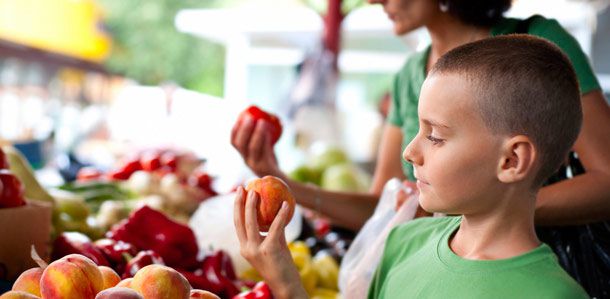When a fruit or vegetable is in season, it means that at that time of year it is at its peak, in terms of flavour or harvest. Eating seasonally is a healthier, more economic and environmentally friendly way of getting your daily 2 fruits and 5 vegetables that is often overlooked. ‘2 and 5’ is a campaign introduced by the government’s Department of Health and Ageing to encourage healthy eating in Australians.
The healthiest way to get your daily fruit and vegetables
The most important advantage of eating seasonally is the health benefits. Seasonal eating includes eating fresh fruits and vegetables that haven’t been processed or transported long distances.
Processing foods includes things such as tinning, blanching and dehydrating foods to enhance their life span. Blanching involves heating a food very quickly with steam or water and this often removes a number of vitamins in the food. This frequently occurs before a food is tinned or frozen. Freezing processes themselves do not cause too much damage; it is the blanching that occurs beforehand that does the harm. Dehydrating can reduce the Vitamin C in some fruits but on the other hand can enhance other nutrients.
Therefore, it is best to eat fresh fruits and vegetables whenever it is possible. Seasonal eating is also a great way to encourage a bit of variety in your diet. You can guarantee that an in-season piece of fruit or vegetable will taste better too!
 Support the locals!
Support the locals!
The benefits of choosing fruits and vegetables that are in-season also include support for local farmers and producers. Your money goes directly to them and encourages a much more sustainable way of eating. The methods used by supermarkets to provide you with out of season foods all year round cannot be maintained and cause harm to the environment.
Do your bit for the environment
Eating seasonally not only supports the local growers, but it also benefits the environment. It decreases the environmental damage which comes with shipping foods across large distances such as the energy used to refrigerate them. A fruit or vegetable is also easier to preserve in its own season as fewer chemicals are needed to fertilise it and less energy is used to create the temperature and surrounding environment it needs.
Save a dollar or two…
You will also find that foods in season tend to cost less as well. The lower prices are due to the increased supply of particular fruits and vegetables driving the price down. Unfortunately in our busy cities this benefit is not as noticeable due to the stabilising effect on prices created by transport and handling costs. If you really want to see the difference, buy your fruits and vegetables from a local producer as opposed to the supermarket.
References
More information on seasonal fruits and vegetables
 |
Find out more about seasonal fruits and vegetables. Seasonal fruits and vegetables. |
 |
Learn which fruit and vegetables to buy from your local producer this Autumn. Autumn fruits and vegetables |
 |
Find out which fresh and local vegetables will be great in your soups this winter. Winter fruits and vegetables |
 |
Find out more about which fruits and vegetables to keep your eye out for this summer. Summer fruits and vegetables |
 |
Learn which fruit and vegetables to buy from your local producer this spring. Spring fruits and vegetables |



 (8 votes, average: 4.00 out of 5)
(8 votes, average: 4.00 out of 5) 






